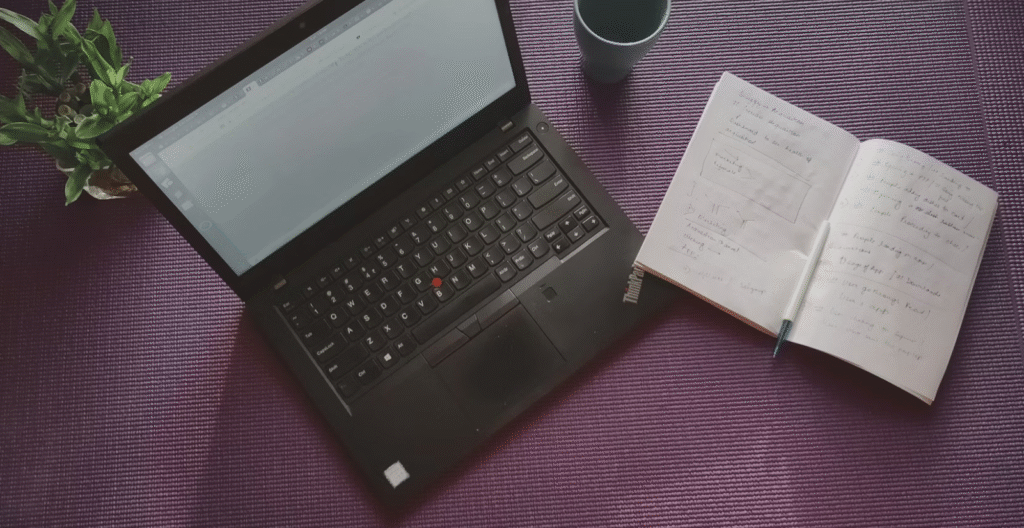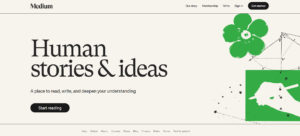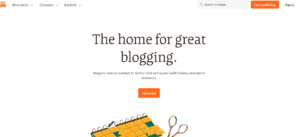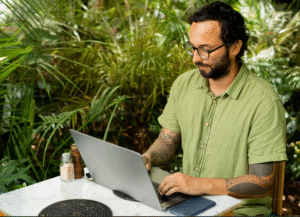
There’s a weird belief floating around the internet that if you don’t have a personal website, you can’t be a ‘real’ blogger. But truthfully? That’s just noise. What matters is having something worth saying and the courage to hit publish.
If you’ve been holding back because the whole website thing feels too technical or expensive, you’re not alone. And you’re not stuck either. Learning how to start a blog without a website is something more and more creators in India are doing and doing really well. In this guide, we’ll explore easy, no-cost ways to publish your first blog and share your thoughts with the world, without worrying about the tech.
TL;DR
- Blogger offers a simple website-like experience for beginners, with easy customization and integration with Google accounts.
- It’s great for casual bloggers who want more control over layout, design, and content management without dealing with complex technical aspects.
- You can even attach your own domain later if you wish to scale your blog.
- It’s a popular choice in India for new bloggers due to its ease of use and free hosting.
- Ideal for writers who want to share personal stories, poems, or topics like recipes without much hassle.
How to Start a Blog Without a Website?
You might think blogging is slowing down in the age of reels and short-form content, but the reality is just the opposite.
There are over 700 million blogs online as of 2025, with more than 7.5 million new posts published every single day. In fact, platforms like WordPress power around 70 million posts per month, while blogs on Medium reach 100 million monthly readers. This tells us two things:
1. Blogging is alive and thriving, and
2. There’s a vast audience out there waiting for your voice.
In the next section, we’ll look at some of the most reliable free tools that give you this space, no website required.
6 Top Free Websites to Start Blogging Without a Website
For anyone trying to figure out how to start a blog without a website, there’s no shortage of options, but knowing where to post makes all the difference. A lot of us in India want something simple, fuss-free, and preferably free. And thankfully, that’s exactly what many blogging platforms now offer.
Let’s walk through a few that can help you get started today.
1. Medium

Ask around or look up “How to start a blog”, and you’ll notice that Medium always finds a way into the conversation. And that’s not just SEO magic. It’s because Medium offers what most beginners and even seasoned writers are really looking for: a peaceful place to write, no website headaches, and a real audience that reads for meaning.
If your writing leans towards stories, reflections, or thoughtful deep-dives, Medium gives you a space where your words won’t get buried.
Best for:
- Writers who want to explore deep or personal topics
- Students or professionals building their writing habit
- Creators who prefer a calm, minimalist platform
2. Substack

Substack gives you a different kind of blogging space, one where every post goes directly to your readers’ inboxes. It’s a great platform for niche writing, opinion pieces, or series-style content. For Indian writers looking to create a small, loyal reader base, Substack removes the noise and brings in that one-on-one connection.
You don’t need any design or website knowledge. Just focus on your writing, and build your audience over time.
Best for:
- Writers who prefer a direct connection with readers
- Bloggers building a niche around specific themes
- Creators who may want to monetise later
3. The WebLearners

Tired of complex platforms or getting lost in the crowd? WebLearners is a growing space that lets you publish your blogs with zero setup and, more importantly, helps you build your blogging presence from day one.
It’s built for new-age Indian creators who want something more purposeful. But what really makes it stand out? Your posts won’t just sit in a feed; they’ll soon become part of a mini portfolio, neatly sorted by category.
Best for:
- Freshers who want a blogging space to call their own
- Writers looking to build a portfolio with organised content
- Indian creators trying to grow visibility from scratch
Sign in today to start writing without a portfolio.
4. Blogger (By Google)

If you’re someone who wants more control than just typing and posting, Blogger is worth a try. It’s free, connects easily with your Google account, and gives you control over layout and design.
It’s been around for years, and while it’s not flashy, it still works well, especially for those who like a more “website-feel” without the tech stress. You can choose templates, customise layout, and even attach your own domain later. For many Indian bloggers, this is still the first platform they used, and for good reason.
Best for:
- Writers who want a simple website-like experience
- Casual bloggers sharing poems, journals, or recipes
- Users comfortable with basic Google tools
P.S. If nutrition or wellness is your thing, here’s a quick blog on gut-friendly foods you can explore for some inspiration.
5. LinkedIn

Bet you didn’t expect this one here, but LinkedIn is quickly becoming a great blogging space, especially for students, professionals, and career-focused creators. If you write about topics like career advice, workplace culture, freelancing, or industry-specific knowledge, your posts here can attract real opportunities.
And since it’s already a networking platform, your blogs have a better chance of being seen and even shared by people who matter in your field.
Best for:
- Students sharing experiences or advice
- Professionals building credibility in their field
- Freelancers trying to attract new clients
6. Instagram

If writing long posts isn’t your thing, but you love sharing ideas through images, captions, or mini tips, Instagram is your stage. Many Indian creators are now using carousels and even the new Notes feature to create “mini blogs” that are quick, visual, and super shareable.
Whether you’re into fashion, travel, productivity, or even poetry, you can turn your Insta feed into a creative blog space. It may not feel like a blog in the traditional sense, but in 2025, this is how a lot of people blog.
Best for:
- Writers who want to test content before committing to a platform
- Visual creators who love designing posts
- Bloggers looking to grow quickly on mobile
Figuring out where to post is just one part of the journey. What comes next is showing up with ideas, week after week. And well, life doesn’t always make it easy.
If you ever feel stuck or unsure what to write next, there’s a really helpful read on free AI tools that might just help you find your spark again.
Benefits of Starting Your Blog Without a Website

By now, you’ve seen how many free tools are available for anyone wondering how to start a blog without a website. From minimalist platforms to niche-friendly spaces, there’s no shortage of options. But beyond the how, let’s talk about the why. Why are so many beginners skipping websites and jumping straight into blogging?
1. Zero Tech Headaches
One of the biggest reasons people delay blogging is the fear of technical setup. But when you start without a website, there’s no need to worry about installing themes, coding, or managing a CMS. These free tools are built for beginners, so the process stays simple and stress-free.
2. Budget-Friendly (Or Completely Free)
If you’re a student, freelancer, or just someone testing the waters, you don’t want to invest thousands in a website right away. Most of the platforms we mentioned are free or have optional paid upgrades. This lets you explore your blogging journey without the pressure of spending money from day one.
3. Perfect for Experimenting
When you’re just starting, you don’t always know what you want to write about or how you want to say it. Blogging without a website lets you test out different topics, tones, and formats freely. Think of it like your trial phase before going big.
4. Helps You Discover Your Audience
When you share your blogs on platforms like Medium, Substack, or even fresh Indian spaces like TheWebLearners.com, you slowly start noticing who’s reading your content and what kind of posts get attention, comments, and shares. This helps you understand your audience without needing expensive analytics tools. And when you eventually create your own blog, you already know who you’re writing for.
Guess what? You are still doubting your capabilities. Well, not anymore. Watch this video below to get paid for your capabilities:
If you’re wondering, “But how will people take me seriously without a portfolio?”, we get it. That fear is real, but also very solvable. Take a look at this piece on starting your blog as a beginner without any portfolio; it walks you through exactly how to take those first steps with confidence.
Final Thoughts
So here we are. You’ve explored how to start a blog without a website, discovered tools that work, and seen the benefits of doing it too. Truth is, you already have what it takes. The only thing left? Hitting that first ‘publish’.
So… What’s stopping you from writing that blog you’ve been talking about since forever? Tell us in the comments; we’re not judging, promise!
Oh, and if you’re secretly wishing for a chill place to publish it, TheWebLearners is slowly becoming just that.
FAQs
- How to Start a Blog Without a Website for Free?
To start a blog without a website for free, you can use platforms like TheWebLearners, Medium, Blogger, or WordPress.com. These platforms allow you to create and publish blog posts without the need for a self-hosted website. You only need to sign up, choose a blog template, and start writing. These platforms also provide free hosting, so you don’t need to worry about technical aspects like server management or domain registration. - How to Start a Blog Without a Website on Reddit?
Starting a blog without a website on Reddit isn’t possible in the traditional sense, as Reddit is more of a content-sharing platform. However, you can still engage with communities on Reddit, post your content, and discuss blog-related topics. You can also promote your blog (from platforms like Medium or Blogger) by sharing links to your posts in these communities. - How to Start a Blog Without a Website for Beginners?
For beginners, the easiest way to start a blog without needing a website is by using platforms like Weblearners, WordPress.com, Blogger, or Wix. These platforms provide templates, easy customisation, and free hosting. With no technical knowledge required, you can simply sign up, choose a theme, and start creating content. They also offer the ability to upgrade to premium plans for more features and control down the line.








Loved this one — I went through the whole thing and shared it
right away on Twitter and Facebook. Some of my friends sent me a DM saying they loved it too.
Keep this up — can’t wait for the next post! If you’re interested in blogging using WordPress, you can visit my blog: https://bloggersneed.com/